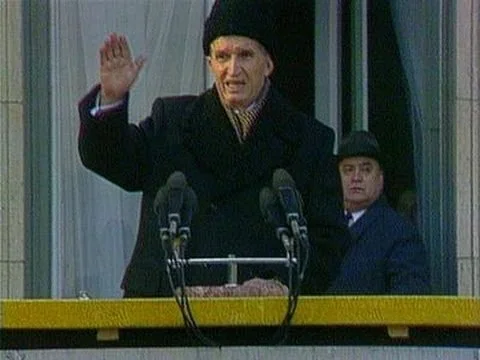
To listen to today’s reflection as a podcast, click here
A few days before Christmas 1989, things looked precarious for authoritarian Communist leaders.
The Berlin Wall had fallen. The Soviet Union was on the ropes. Revolutions were toppling Eastern European governments.
Nikolae Ceausescu, who had ruled Romania by means of sheer brutality since 1965, was determined to be the exception. He was convinced his people loved him. Or respected him. Or at least feared him.
Ceausescu called for a massive demonstration of support on December 21 in the center of Romania’s capital, Bucharest. There had been riots a few days earlier in the city of Timisoara. But these 80,000 people would be compelled to stand, applaud, and cheer. For him, of course.
In addition, the entire country would be tuning in. Ceausescu had demanded that every citizen cease all activities, sit in front of a TV, and listen attentively to his speech. That decision would turn out to haunt him.
Things started predictably enough. Ceausescu stood on an outdoor balcony, flanked by party officials, bodyguards, and his wife Elena, who was deeply unpopular with the Romanian people. Those at the front of the crowd clapped obediently.
A few minutes into his speech, the dictator launched into the kind of innocuous statement he had made a million times before: “I want to thank the initiators and organizers of this great event in Bucharest, considering it as a…”
He never finished the sentence.
Something incredible was happening. Someone in the crowd had booed.
This was unprecedented. Impossible. Certainly a fatal error for the one who had raised his voice.
But no one has ever figured out who did it. And suddenly, the booing, whistling, jeering, and shouting became contagious. The crowd began to go crazy. The secret police ordered the broadcast crew to terminate the video feed immediately. They refused. The cameras were momentarily pointed away from the platform. But the microphones picked up every sound.
The nation of Romania heard its iron-fisted leader scolding the audience. “Hello! Hello!” he shouted, as if there was merely something wrong with the PA system. Why were people not hanging on his every word?
Ceausescu instructed the audience to be quiet. They refused. Elena called for silence. Nikolae snapped at his wife, “Shut up!” This was all happening on live TV.
Ceausescu was briefly able to splutter a few more of his prepared remarks. But the die was cast. If you search online for “final Ceausescu speech,” you can witness the instant that an entire world, one that had seemed invincible, suddenly collapsed under its own weight.
On Christmas Day, the Ceausescus were captured by armed forces that had turned against them. They were subjected to a hasty trial and summarily executed.
How had this happened? Millions of Romanians had long known that their nation had been crippled by the Ceausescu regime. But revolution tends to await a tipping point – a courageous voice, followed by others, that declares, “There is a better way to live.”
William Wilberforce almost singlehandedly helped awaken 19th century England to the horrors of the slave trade. Alexander Solzhenitsyn compelled the world to grasp the evils of Soviet Communism. Desmond Tutu courageously helped South Africa abandon apartheid.
All three spoke from a bedrock trust in God. And old worlds that had seemed invincible suddenly collapsed.
Most of us imagine our own voices to be small and insignificant.
What chance is there that we will be heard above the crowd?
Speak up anyways.
You may be the tipping point.
